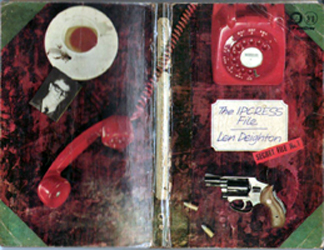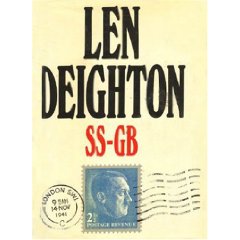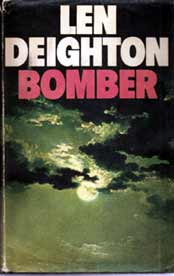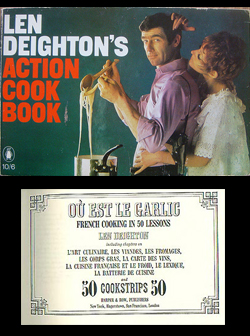|
Appreciations
THE IPCRESS FILE
It’s hard to realize today what an impact Len Deighton’s remarkable spy novel had on its first appearance in the 1960s. Like le Carré, Deighton was reacting against the glossy, unrealistic depiction of espionage in the novels of Ian Fleming (a certain Puritanism was a factor at the time, less à propos these days, now that Fleming’s considerable virtues have been recognized). But certainly The Ipcress File, with its insolent working-class hero and low-key treatment of all the quotidian details of a spy's life (endless futile requisitions for petty cash, a decidedly unglamorous secret service HQ) was astonishingly fresh, while the first-person narrative was a sardonic Londoner’s refraction of Chandler’s Marlowe-speak two decades on. Another radical touch was the refusal to neatly tie up the narrative with a cathartic death for the villain – the shadowy opponent of Deighton’s unnamed protagonist is – for political reasons – unpunished. A series of novels in the same vein followed, none quite as impressive as this debut – but all highly accomplished.
- Barry Forshaw, editor of British Crime Writing Encyclopedia

This is something Michael Caine agrees with me about. Or perhaps it’s the other way around. Either way, we both regret that Deighton’sAn Expensive Place To Die was (like companion volume Horse Under Water) never made into a Harry Palmer film. But then again, maybe it is just as well. It is impossible to summarise the plot in that two-sentence pitch Hollywood still loves (“It’s Goldfinger Meets Raymond Blanc at The Priory”), so getting a workable script would have been a nightmare. Remember, legend has it that if any friend told Deighton they could follow the plot of The Ipcress File, he would jumble it up some more. Deighton put the storyline of AEPD into a Moulinex and left it to run. There is a shady artist, explosive dossiers, double-double- crosses, institutionalised voyeurism and Chinese nuclear weapons. It doesn’t matter because the book is a love letter to two things: the (brilliantly rendered) exoticism ofParis in the sixties and a certain anonymous English spy, described as ‘truculent and cynical’ on my book flap, but also whip-smart and unflappable. Reading it, you can well see why a young Michael Caine imagined himself walking off the page. The character that the movies christened ‘Harry Palmer’ became synonymous with Swinging London and Cold War Berlin, but this Deighton reeks of garlic, Gauloise and cuisine faite par le patron, as well as governmental treachery. My copy may have the one of the worst jackets of all time, in which the hero is rendered, alarmingly, as a Mr. Bean look-a-like, but in many ways the book hasn’t dated at all. All you have to do is change the E-Type to an XF, give him a mobile phone and the world-weary, put-up, suspicious secret agent would fit nicely into the world of Spooks. And Paris is still an Expensive Place To Die.
- Robert Ryan author of Empire of Sand and Underdogs
Len Deighton added a change of direction in espionage fiction from the glamour and excesses of Ian Fleming’s James Bond, into the downbeat reality of life behind the looking glass with his cynical anti-hero Harry Palmer. The Palmer novels were of course The Ipcress File [1962], Horse Under Water [1963], Funeral in Berlin[1964], Billion Dollar Brain [1966], A Expensive Place to Die [1967], Spy Story [1974] and Twinkle, Twinkle, Little Spy [1976] US title Catch a Falling Spy. Incidentally as they all feature first person narration; the protagonist Harry Palmer is never actually named and in fact in the last two novels, Deighton stated that the protagonist [Patrick Armstrong] is a different character than in the preceding four.
It was the film versions that gave the anti-hero his name. For many readers however, Harry Palmer would be the antithesis of Ian Fleming’s James Bond, especially when one compares the actors who played James Bond at the time. Sean Connery’s James Bond, compared to Micheal Caine’s Harry Palmer was a polar opposite. Coincidentally Bond producer Harry Saltzman was also involved with the Harry Palmer films. The protagonist in these novels [Harry Palmer] is a Grammar school boy working for Public school boys, and cynical toward the world he sees around him, they are required reading for anyone with interests in British espionage fiction of that period.
My personal favourite of the Palmer novels is of course The Ipcress File [1962], because it was the first Deighton novel that passed my table; but also its blue collar hero’s insight is delightful. The tale reveals that the hunt for a missing scientist is linked to a large scale conspiracy that only the working class hero can solve.
– Ali Karim assistant Editor of www.shotsmag.co.uk
CLOSE UP
Most of the best writers are versatile. While they may achieve fame through one particular novel, or type of novel, they are likely to have the breadth of mind, and talent, to turn their hand to a wide range of different subjects. Len Deighton will always be associated with the spy novel, and I have long been a fan of books like Bilion Dollar Brain and Horse Under Water. But I admire some of his other work just as much. I’m not qualified to judge his cookery books, or his travel guides, but I enjoyed Only When I Larf, and, perhaps even more, the routinely overlooked Close-Up.
Close-Up was published in 1972, and I read it a couple of years later. It’s set in the film world and presents the story of a fading star called Marshall Stone. Deighton spent some time working in the movie business, and he put his experience of the business to good use. The gap between image and reality is convincingly portrayed. Above all, the material offers tremendous scope for Deighton’s sardonic humour. Not least right at the end when the mogul Koolman says: ‘Close-Up. I’d never buy a title like that. It’ll mean nothing on a marquee in Omaha.’.
- Martin Edwards, crime writer and legal expert
I first met Len Deighton in the Mucky Duck (aka The White Swan, the Daily Mail pub off Fleet Street) when The Ipcress File had just hit the best-seller lists. He couldn't believe his luck. Up to then he'd been known - if at all - as a cookery writer in national papers. Nice bloke, he seemed then.
As for the films, I think they worked very well. Caine was particularly good as Harry Palmer (not that Deighton ever gave his hero a name). Billion Dollar Brain was the least impressive of the movies but then it was extremely complicated and by that time there was a lot of Hollywood money involved (to say nothing of the eccentric Ken Russell) and everything became too overblown.
Personally - though I very much took to the guy - I wasn't all that happy with Deighton. At the time I'd just written my first spy novel, The Matter of Mandrake, rather in the James Bond genre, and I wasn't too chuffed about some bloke coming along and moving the whole business from upper and middle to the working class. But his were bloody good books and I still enjoy the films.
- Barry Norman, thriller writer and film critic.
I well remember the first time I met Len. He had come to a meeting of the Crime Writers Association with a view to joining; somehow or another we began talking. The meeting came to an end and Len said to me "Come and have a meal somewhere". We went to a nearby Chinese where the waiter had some difficulty using both serving spoon and fork in the one hand. Len looked up at him and said simply: "It's difficult, isn't it? I used to have the same trouble when I was an aircraft steward".
Awkward situation vanishing in an airy puff of smoke. And I thought What a simply nice man he is. A belief I have kept to this day.
- H.R.F. Keating creator of the Inspector Ghote crime series
SS-GB

SS-GB is a remarkable crime novel, set in 1941 London, but in anEngland which has lost the war and is occupied by the Nazis and from the opening line of dialogue – “Himmler’s got the King locked up in the Tower of London” – you know you are in classic Deighton territory.
The plot revolves around the murder of a scientist in a seedy back room in Shepherd’s Market and the detective work of the upright and honourable Douglas Archer (“of the Yard”), one of the Metropolitan Police’s top cops. Archer has a shrewd idea “whodunit” almost from the off, but that’s not the point, for the murder turns out to be only the tip of a serpentine trail of espionage, double-crossing and triple-crossing which involves atomic research, the fate of the imprisoned King George VI, the neutrality of the United States and, of course (this being the author of The Ipcress File) the deadly rivalry between various intelligence agencies as to who will be top dog.
There are some marvellous set pieces: the chilling raid by the SS on the school of the widowed Archer’s son, the surreal escape of the King from the Tower which results in him being pushed in a wheelchair through fog-bound London, the blowing up of Karl Marx’s grave in Highgate Cemetery during a celebration of Nazi-Soviet relations and the sinister, quite chilling, appearance of a face at a train window which turns out to belong to Heinrich Himmler.
But the dark heart of the story is what Deighton does best: the internecine warfare between protagonists supposedly on the same side. In SS-GB, the power struggle is between the seemingly jovial Gruppenfuhrer Kellerman of the SS and Standartenfuhrer Huth of the SD (the SS’s intelligence service), which reprises the scenario of Dalby and Ross always jostling for position in The Ipcress File. In all such battles, of course, there is collateral damage which drives the tension and allows amasterful author to make some crucial observations of human nature.
Critics of the book may say it is simply The Ipcress File re-written as imaginary history. Well if it is, so what?
Just sit back and marvel at the imagination it took to do it.
- Mike Ripley creator of the Angel crime series and keen archaeologist
BOMBER

I came to Deighton as a result of Ipcress File, which is certainly an excellent book and film, but for me his greatest work has to beBomber. It is a magnificent anti-war work, and shows the courage of the young bombers without glorifying their work. Rather, by looking at the victims of the bombing run, it shows the futility of their actions.
The story itself looks at the final raid of a Lancaster. Pilot Sam Lambert has made it from the beginning of the war to this point, and although he’s suffering from exhaustion and nervous strain, his crew revere him. They count on him as their talisman. But the pathfinder Mosquito is shot apart and her load of incendiaries, designed to mark out a city (Krefeld) instead falls short, and the whole exercise is set to drop on a small town, Altgarten.
More recently there have been explanations of the full horror of towns which were bombed in this way. Deighton describes in precise, clinical detail how the multiple fires lead to a firestorm, and what that means for the poor inhabitants.
And that is his great skill. This story is not one person’s tale. It is a set of interlinked lives, and he looks at the attack from all points of view. It is this which gives the story its enormous power. And, of course, its horror.
I’d recommend the book to anyone.
-Mike Jecks hailed as the master of the medieval murder mystery
FUNERAL IN BERLIN

It’s iniquitous to have to pick out one of Deighton’s many masterpieces but if I’ve got to it has to be Funeral in Berlin.Deighton’s take on spies and the Cold War always seemed more realistic to me than that of his rivals. He didn’t go for the fake glamour of Fleming. This was espionage as it ought to be if you think about it: rough, raw, cold and inhuman. Funeral in Berlinmagnifies this sense of the ‘great game’ by putting chess at the heart of the book, with a quotation about the game fronting every chapter.
The Russian Colonel Stok boasts about being one of the best chess players and asks the anonymous British hero whether he liked the game too. Our man (who is not, as any Deighton fan knows, called Harry Palmer), replies, ‘Yes, but I prefer games where there is a better chance to cheat.’
Which makes him the better spy, naturally. Deighton as his best was unique, an original who could handle character and plot with extraordinary aplomb, and make places like Berlin, torn apart by the Wall, seem as real as any grotty London suburb. One of the 20th century greats.
- David Hewson author of the Nic Costa thrillers
BILLION DOLLAR BRAIN
I first made the acquaintance of Len Deighton over forty years ago when we spent a rainy weekend in a caravan on the Devon coast. Someone had left behind copies of The Ipcress File, Horse Under Water and Funeral in Berlin. I was captivated by them and have been a devoted fan of Deighton’s work ever since. He really qualifies as a member of the Magic Circle because his spy novels find new conjuring tricks every time. Of the other books, Bomber is my favourite. But if I got stuck in a caravan during a storm again, the novel I’d prefer to re-read would be Billion Dollar Brain. It’s fast, funny, idiosyncratic, unashamedly corny and it contains just enough information about the subjects on which it touches to give the impression that the author is an expert on each one. Only a master storyteller can do that.
- Keith Miles aka Edward Marston
LEN DEIGHTON’S COOKBOOKS

Whenever I make an omelette, I think of Len Deighton. A couple of years ago, the BBC screened a documentary in which the great man revealed that he always adds a tiny splash of water to a bowl of freshly cracked eggs. Ever the scientist, Deighton had learned that the shell of an egg is porous; water vapour is apparently escaping through it all the time. Before cooking, the discerning chef should always restore the egg’s molecular structure with a tiny amount of water.
Does it work? Don’t ask me. But plenty of Deighton’s other cooking tips, culled from his culinary classics Ou Est Le Garlic? andLen Deighton’s Action Cook Book, have served me well for many years. Did you know, for example, that if you’re putting oil and vinegar onto a salad, you should always put the vinegar on first, otherwise the oil creates a coating on the lettuce upon which the vinegar will be unable to obtain a grip? Len taught me that.
If I’m making Deighton sound overly fastidious, I don’t mean to. When it comes to cooking, he is a man of immense learning, but also one determined to take the mystery out of the process of turning raw ingredients into simple, delicious meals. Deighton was, for a time, The Observer’s cookery writer, the Nigel Slater of the Swinging Sixties, and every week would draw a simple cartoon strip to illustrate the stage-by-stage process of preparing a particular dish. These strips are reproduced in Ou Est Le Garlic? and the Action Cook Book. They show the amateur cook how to prepare everything from a simple chicken stock to Coquilles St Jacques, from a hollandaise sauce to Osso Buco. Legend has it that one of the strips is hanging in Michael Caine’s kitchen in the film of The Ipcress File.
There is no doubt that the books, which were published in the mid-1960s, were intended partly to cash in on the huge success of Deighton’s early novels. The Action Cook Book, in particular, was marketed at trendy British bachelors who wanted to act like Harry Palmer but froze in terror at the sight of a potato. The cover of my copy shows a woman in a negligée running her fingers through the hair of a square-jawed brute busily tossing a pan of spaghetti while winking at the camera. The implication is clear. Learn how to stuff a Chicken Kiev properly, lads, and you’ll have her clothes off in no time.
But these are serious cookbooks. I wouldn’t trade mine for any of the so-called modern classics by Gordon and Jamie and Nigella. Long before Heston Blumenthal came along with his egg and bacon ice cream and his canister of liquid nitrogen, the young Len Deighton was schooling himself in the science of French cuisine. There’s very little the author of Billion Dollar Brain doesn’t know about the boiling point of clarified butter or the impact of heat on a shin of veal. But he doesn’t make you feel bad for your culinary ignorance. Quite the opposite, in fact. The books are chatty and low key, with that lovely dry wit which characterises the novels. Here is Deighton on vinaigrettes:
“American cooks add half a dozen more garnishes to salad dressing, including lemon peel, chopped cheese, curry powder, ketchup and, even more terrible, sugar. I give you this information to demonstrate the depths of depravity to which it is possible to sink.”
Of course, being forty years old, certain elements in the books are out-of-date. There’s a bit too much stuff involving aspic, and a recipe for tripe and onions which should be consigned to a time capsule. Rumour has it that an enterprising editor at Harper Perennial has hit on the idea of repackaging the cookbooks for a 21st century audience. I certainly hope that’s true, and I certainly hope that the all-new versions won’t excise these anachronistic details. They are part of the books’ charm. In my view, Ou Est Le Garlic? and Len Deighton’s Action Cook Book are classics of British cuisine, and every bit as central to Deighton’s reputation as Harry Palmer, Bomber, and Hook Line and Sinker.
-Charles Cumming, author of TYPHOON
Okay, I’ll come clean. I’m a great fan of all Len Deighton’s work, but my favourite thriller is his Action Cookbook (and its companion Où est le Garlic?). For over forty years, and decades before it became top of the pops at UK restaurants, his crème brûlée has thrilled my family and friends. In my single days in the 1960s these two cookbooks were both full of information and of such delights as garlic mayonnaise, Baked Alaska, cheesecake, mousses, pommes de terre Dauphinoise, caper sauce, sabayon... All well known to us now, but then? Wow, how they thrilled.
Thank you, Len Deighton, and happy birthday. Both books are still thrilling me today.
- Amy Myers author of the Auguste Didier series
My main interest in Len Deighton lies in his membership of the select band of writers who have imagined that World War II went the other way, and the Germans and Japanese won. The necessary premise almost always is that Churchill is dead by 1940 or 1941 – Deighton has him killed by Himmler, the royal family imprisoned and the SS in Whitehall. It’s a long time since I read SS GB(published 1978) but I seem to remember that he sticks to the immediate period of his alternative history. The other hands set their stories well into the aftermath of the war. Fatherland (Robert Harris) is evidently taking place in the Sixties, with a nice little aside to the Beatles launching their career in Hamburg just as they did in ‘real’ history. Giles Cooper’s disturbing TV play The Other Man went out in 1964 as a contemporary yarn of an upright British army officer doing the Nazis’ bidding in a protracted racial war in Asia. Inside every decent man, Cooper was suggesting, is this ‘other man’ waiting to take over.
Another television work, Philip Mackie’s three-part An Englishman’s Castle (1978), depended on what might be called the mirrored mirror image. Kenneth More, as a drama producer in the German-monitored BBC, daringly embarks upon a soap opera of life as it might have been if Britain had not been subjugated. Which brings us to the wizard of this whole genre, Philip K.Dick. The Man in the High Castle (1960) has the Germans ruling the Eastern American states, the Japanese the Western, but separated by the demilitarised buffer zone of the Rocky Mountains. There lives the title figure, writing his alternative history and making it perhaps too wishful a picture of super-power America. So Dick flirts, just for a moment, with an astonishing possibility. His main character, a Japanese official in San Francisco, suffers a dizzy spell while walking in his city, Suddenly the clean, peaceful streets are full of cars. And ahead of him looms a vast structure shutting out the sky and carrying yet more automobiles. ‘What’s that?’ he mumbles to a passing stranger. ‘Awful, ain’t it? That’s the Embarcadero Freeway.’ Mr Tagomi has been vouchsafed a glimpse of the world as we have it. Though Len Deighton had shown himself to be a master of thetrompe l’oeil when he revealed in The Ipcress File that the hideous foreign prison in which his hero had been tormented was actually inLondon, I don’t think he ever risked pulling the rug from under his own feet quite so confidently.
- Philip Purser, thriller writer and former television critic.
Horse Under Water
Horse Under Water is the odd one out among Len Deighton's first four spy novels, and I have the feeling that it's not quite as well known as the others. Perhaps it is because it was not filmed. Or perhaps it is that, unlike the other three, it turns its back on the Cold War and looks instead at the aftermath of World War Two. Of course, when Horse Under Water was published in 1963, the war was a not so distant memory. The story is about the attempt to recover the cargo of a U-boat sunk off the Portuguese coast, which contains a Russian doll-like set of secrets. At first it seems to be counterfeit money, then it turns out to be heroin - the 'horse' of the title - and then it materialises as a compromising list of the British high-ups who would have collaborated after a Nazi invasion. The main villain here is a Cabinet minister and the scene where the narrator confronts him is a little like the scenes where Bond faces Dr No/Goldfinger/Blofeld. Except that Deighton makes it realistic. Realism is the keynote in these books, from the footnotes to the mysterious acronyms like W.C.O.O.(P) to the explanation of how secret information is stored. Maybe it was all true, maybe none of it was. I suspect it's about half and half, though. No spy writer has ever done with such cool authority.
- Philip Gooden, author of the historical Nick Revell series
|